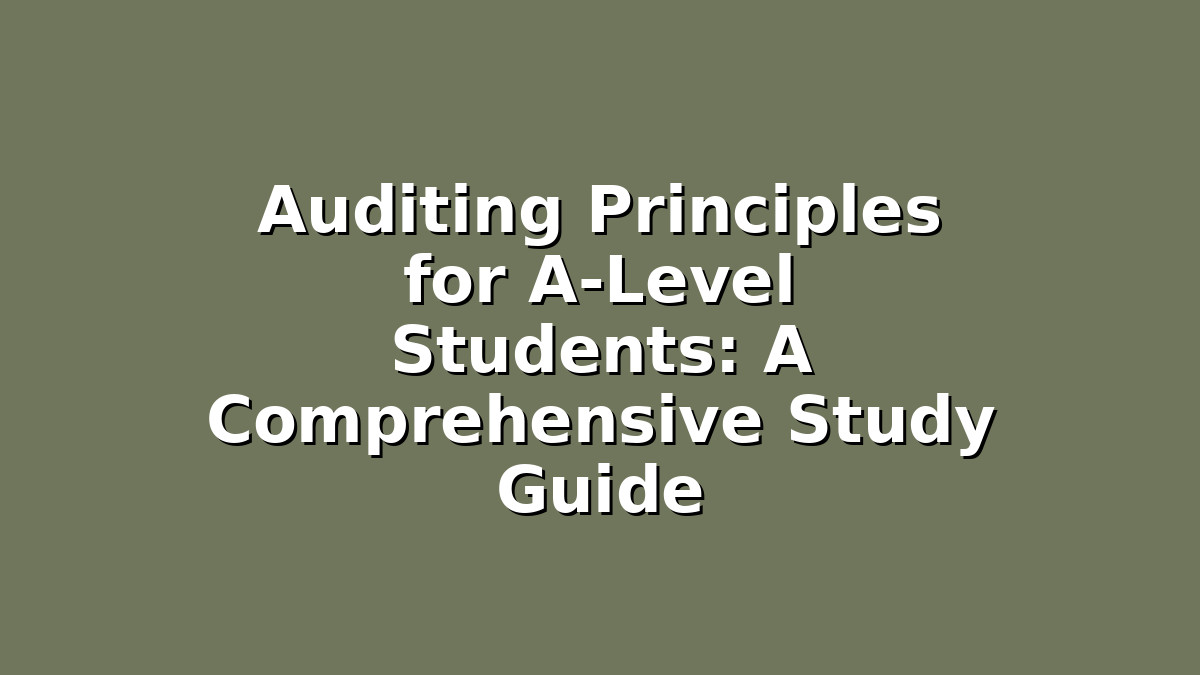Preparing for A-Level exams can be challenging, especially when tackling complex subjects like accounting and auditing. Among these, understanding auditing principles is crucial if you want to excel in your finance or business studies. Auditing forms the backbone of financial integrity, ensuring that companies’ financial statements are accurate and trustworthy. As an A-Level student, grasping the core auditing principles will not only help you pass exams but also build a solid foundation for further studies or a career in finance.
In this guide, we’ll break down key auditing principles and provide study tips tailored specifically for A-Level students. Whether you are revising for your upcoming exams or simply want to deepen your understanding, these insights will help you approach auditing with confidence.
1. Understand the Fundamental Auditing Principles
Before diving into exam questions, it’s important to familiarize yourself with the fundamental principles that guide auditors in their work. These principles provide the framework for conducting effective and ethical audits and include:
– Integrity: Auditors must be honest and impartial.
– Objectivity: Avoid bias and conflicts of interest.
– Professional Competence and Due Care: Maintain necessary skills and perform work diligently.
– Confidentiality: Keep client information private.
– Professional Behavior: Comply with laws and avoid actions that discredit the profession.
Study Tips:
– Create flashcards for each auditing principle with definitions and examples. Repeated review will help you retain these concepts.
– Use real-life case studies or news articles about auditing failures and successes to see these principles in action.
– Write short summaries explaining each principle in your own words, which reinforces understanding and makes recall easier during exams.
Focus on mastering these fundamental principles first, as they often form the basis for exam questions and practical scenarios.
2. Learn the Audit Process and Key Terms
Auditing is not just about principles but also about the structured process auditors follow to evaluate financial statements. Breaking down the audit process into clear stages helps students organize their knowledge and answers in exams.
Key Stages Include:
– Planning: Understanding the client’s business and identifying key risk areas.
– Risk Assessment: Determining where errors or fraud might occur.
– Internal Controls Evaluation: Assessing the company’s systems to prevent and detect errors.
– Gathering Evidence: Collecting sufficient and appropriate audit evidence through tests.
– Reporting: Providing a clear audit opinion based on findings.
Important Terms to Know:
– Materiality
– Audit risk
– Substantive procedures
– Control risk
– Detection risk
– Audit opinion types (unqualified, qualified, adverse, disclaimer)
Study Tips:
– Create a flowchart or mind map of the audit process to visualize the sequence and connection of steps.
– Make a glossary of key auditing terms with simple definitions.
– Practice past exam questions that require you to explain or apply these terms.
– Teach a friend or study group how the audit process works; explaining concepts aloud can deepen your understanding.
By linking principles with practical steps and terminology, you’ll be better prepared to tackle both theory and application questions.
3. Practice Exam Technique and Time Management
Understanding auditing principles and processes is essential, but success in exams also depends on how you approach answering questions and managing your time.
Study Tips:
– Answer the Question Asked: Carefully read the question to determine whether it asks for definitions, explanations, or application of principles. Tailor your answer accordingly.
– Use the IRAC Method: For scenario-based questions, apply the Issue, Rule, Application, and Conclusion format. Identify the issue, state the relevant auditing principle (rule), apply it to the facts, and conclude.
– Plan Your Answers: For longer questions, spend a minute outlining your main points before you start writing. This approach helps keep your answer structured and relevant.
– Practice Past Papers: Regularly attempt past exam papers under timed conditions. This helps you get used to the format, difficulty, and time pressure.
– Review Mark Schemes: Understand what examiners look for in high-scoring answers, such as clear explanations, use of examples, and correct terminology.
In addition to practicing questions, take regular breaks to avoid burnout and use active recall techniques like self-quizzing. Consistent, focused revision beats last-minute cramming.
Conclusion
Auditing principles might seem complex at first, but with a structured approach, they become manageable and even interesting. By understanding the core principles, mastering the audit process, and sharpening your exam techniques, you will build both confidence and competence. Remember, success at A-Level auditing isn’t about memorizing facts alone but about applying your knowledge thoughtfully and clearly.
Keep practicing, stay curious, and don’t hesitate to use a variety of revision resources—videos, textbooks, study groups, and tutors—to support your learning. You’ve got the potential to excel, and with steady effort, auditing principles will become one of your strengths in the exam hall.
Good luck with your studies!

Responses